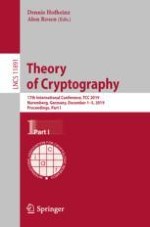2019 | OriginalPaper | Buchkapitel
Secure Computation with Preprocessing via Function Secret Sharing
verfasst von : Elette Boyle, Niv Gilboa, Yuval Ishai
Erschienen in: Theory of Cryptography
Aktivieren Sie unsere intelligente Suche, um passende Fachinhalte oder Patente zu finden.
Wählen Sie Textabschnitte aus um mit Künstlicher Intelligenz passenden Patente zu finden. powered by
Markieren Sie Textabschnitte, um KI-gestützt weitere passende Inhalte zu finden. powered by
